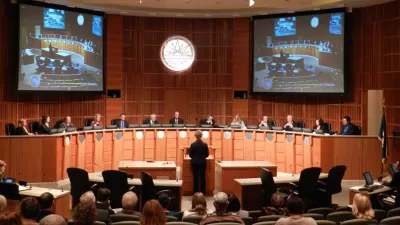Does giving short shrift to grassroots tradition cut against the dynamics of community-based decision-making?

Chuck Wolfe provides perspective on how Mercer Island, Washington—a small, leafy city between Seattle and Bellevue—recently reconstituted the city's Planning Commission in a way that arguably contradicts the dynamics of community-based decision-making, reducing local membership and substituting paid professionals who reside outside the city.
The change also raised concerns among some council members and residents about the implications of replacing residents with non-residents and paid practitioners to make community decisions. A petition, testimony, and letters in opposition stressed the unprecedented approach in the Puget Sound region.
In addition, Wolfe notes that planning commissions have a storied place in American history. Their hallmark was their grassroots composition—an early form of co-creation, a bridge between government and citizenry.
He outlined three concerns:
Will the involvement of non-resident practitioners lead to decisions that do not represent the community?
Will the council’s action weaken residents’ sense of ownership and civic responsibility for community planning?
Similarly, will the commission become disconnected from the local community and its contextual needs, compromising effectiveness and inclusivity?
He concludes that the city must remain mindful of retaining long-term resident wisdom and maximizing civic engagement:
While these forms of participation are often mandated by state law and local code, they need to be more than lip service and more like co-creation.
FULL STORY: Why 'Hack' a Planning Commission?

Alabama: Trump Terminates Settlements for Black Communities Harmed By Raw Sewage
Trump deemed the landmark civil rights agreement “illegal DEI and environmental justice policy.”

Planetizen Federal Action Tracker
A weekly monitor of how Trump’s orders and actions are impacting planners and planning in America.

The 120 Year Old Tiny Home Villages That Sheltered San Francisco’s Earthquake Refugees
More than a century ago, San Francisco mobilized to house thousands of residents displaced by the 1906 earthquake. Could their strategy offer a model for the present?

In Both Crashes and Crime, Public Transportation is Far Safer than Driving
Contrary to popular assumptions, public transportation has far lower crash and crime rates than automobile travel. For safer communities, improve and encourage transit travel.

Report: Zoning Reforms Should Complement Nashville’s Ambitious Transit Plan
Without reform, restrictive zoning codes will limit the impact of the city’s planned transit expansion and could exclude some of the residents who depend on transit the most.

Judge Orders Release of Frozen IRA, IIJA Funding
The decision is a victory for environmental groups who charged that freezing funds for critical infrastructure and disaster response programs caused “real and irreparable harm” to communities.
Urban Design for Planners 1: Software Tools
This six-course series explores essential urban design concepts using open source software and equips planners with the tools they need to participate fully in the urban design process.
Planning for Universal Design
Learn the tools for implementing Universal Design in planning regulations.
Clanton & Associates, Inc.
Jessamine County Fiscal Court
Institute for Housing and Urban Development Studies (IHS)
City of Grandview
Harvard GSD Executive Education
Toledo-Lucas County Plan Commissions
Salt Lake City
NYU Wagner Graduate School of Public Service





























